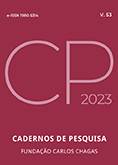Gender inequalities in legal occupations
Keywords:
Legal Labor Market, Gender Relations, ProfessionalismAbstract
The present article seeks to analyze empirically how the educational effect of women in higher education Law courses affects their insertion into the formal labor market. To achieve this goal, we used data from the Relação Anual de Informações Sociais [Annual Social Information Report] (RAIS) to analyze all occupational fields that require legal training. The data show that women were already the majority as court clerks and the like, and became the majority in private law from 2010 onwards. As for the income received, controlled by other variables, women tend to earn less than men in the same occupations, with higher incomes only among public prosecutors and lawyers.
Downloads
References
Almeida, F. de. (2014). As elites da justiça: Instituições, profissões e poder na política da justiça brasileira. Revista de Sociologia e Política, 22(52), 77-95. https://doi.org/10.1590/1678-987314225206
Arantes, R. B., & Moreira, T. M. Q. (2019). Democracia, instituições de controle e justiça sob a ótica do pluralismo estatal. Revista Opinião Pública, 25(1), 97-135. https://doi.org/10.1590/1807-0191201925197
Barbalho, R. M. (2008). A feminização das carreiras jurídicas e seus reflexos no profissionalismo [Tese de doutorado, Universidade Federal de São Carlos]. Repositório Institucional da UFSCar. https://repositorio.ufscar.br/bitstream/handle/ufscar/6663/2026.pdf?sequence=1
Barbosa, M. L. (1993). A Sociologia das profissões: Em torno da legitimidade de um objeto. BIB − Revista Brasileira de Informação Bibliográfica em Ciências Sociais, 36(1), 3-30.
Bertolin, P. T. M. (2017). Feminização da advocacia e ascensão das mulheres nas sociedades de advogados. Cadernos de Pesquisa, 47(163), 16-42. https://doi.org/10.1590/198053143656
Bonelli, M. da G., Cunha, L. G., Oliveira, F. L. de, & Silveira, M. N. B. (2008). Profissionalização por gênero em escritórios paulistas de advocacia. Tempo Social, 20(1), 265-290. https://doi.org/10.1590/S0103-20702008000100013
Bonelli, M. da G., Nunes, J. H., & Mick, J. (2017). Ocupações e profissões na Sociedade Brasileira de Sociologia: Balanço da produção (2003-2017). Revista Brasileira de Sociologia, 5(11), 19-28. https://doi.org/10.20336/rbs.219
Bonelli, M. da G., & Oliveira, F. L. de. (2003). A política das profissões jurídicas: Autonomia em relação ao mercado, ao Estado e ao cliente. Revista de Ciências Sociais, 34(1), 99-114.
Bonelli, M. da G., & Oliveira, F. L. de. (2023). Changes in gender and race composition of the Brazilian Judiciary. Oñati Socio-Legal Series, 13(4), 1351-1375. https://doi.org/10.35295/osls.iisl/0000-0000-0000-1394
Campos, A. G., & Benedetto, R. di. (2021). Mercado de trabalho jurídico no Brasil: Qual é a situação atual? [Texto para Discussão, 2714]. Ipea. https://doi.org/10.38116/td2714
Castilla, E. J. (2008). Gender, race, and meritocracy in organizational careers. American Journal of Sociology, 113(6), 1479-1526. http://www.journals.uchicago.edu/t-and-c
Fragale, R., Moreira, R. S., Fo., & Sciammarella, A. P. de O. (2015). Magistratura e gênero: Um olhar sobre as mulheres nas cúpulas do Judiciário brasileiro. E-Cadernos CES, (24), 57-77. https://doi.org/10.4000/eces.1968
Kahwage, T. L., & Severi, F. C. (2019). Para além de números: Uma análise dos estudos sobre a feminização da magistratura. Revista de Informação Legislativa: RIL, 56(222), 51-73.
Philips, D. J. (2005). Organizational genealogies and the persistence of gender inequality: The case of Silicon Valley law firms. Administrative Science Quarterly, 50(3), 440-472.
Severi, F. C. (2016). O gênero da justiça e a problemática da efetivação dos direitos humanos das mulheres. Revista Direito e Práxis, 7(13), 81-115. https://doi.org/10.12957/dep.2016.16716
Downloads
Published
How to Cite
Issue
Section
License
Copyright (c) 2023 Cadernos de Pesquisa

This work is licensed under a Creative Commons Attribution-NonCommercial 4.0 International License.
Authors who publish in this journal agree to the following terms:
a. Authors retain the copyright and grant the journal the right to first publication, with the paper simultaneously licensed under the Creative Commons Attribution license that allows the sharing of the paper with acknowledgment of authorship and initial publication in this journal.
b. Authors are authorized to assume additional contracts separately, for non-exclusive distribution of the version of the paper published in this journal (for example publishing in institutional repository or as a book chapter), with acknowledgment of authorship and initial publication in this journal.
c. Authors are allowed and encouraged to publish and distribute their paper on-line (for example in institutional repositories or on their personal page) at any moment before or during the editorial process, as this can generate productive changes, as well as increase the impact and citation of the published paper (See The Effect of Open Access).









